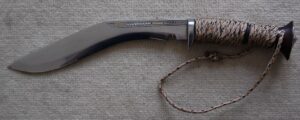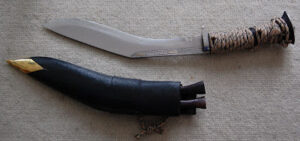In my blog post entitled “Why a Kukri?”, I promised a more in-depth look at my favourite kukri once I could get some more current photos taken. Having just taken such photos, here they are:

This is the plain vanilla kukri as it arrived from Nepal. I call this the "Scrapboard Survivor" after my website.
This is actually a custom item from KHT. The grip was made slightly longer than they usually fit on a sirupate-style blade and the half-guard was combined with a traditional-style grip.
KHT offered a number of modernized grips with guards as an option, but I wanted a traditional style grip since it is actually the optimum for a kukri blade.
KHT now offer the half guard and traditional-style handle on some of their models. As yet, a half guard on a sirupate is a custom request.
A sirupate blade is narrower and more slender than a standard kukri blade, although such distinctions are relative since this blade is still thicker and more substantial than many knife blades costing five times as much.
The result is a lighter, fast and agile tool that still has considerable cutting power. The sirupate can handle most combat and survival applications without weighing the user down excessively.

KHT very thoughtfully provided a cord channel in the grip and the other night I decided it was time I fitted a retention cord. Note the use of a fisherman’s knot, which allows the cord to be easily tightened or loosened depending on whether gloves or other clothing is worn. The loop is proportioned so that it can either be slipped over the wrist or hooked over the thumb and passed over the back of the hand, “nightstick” fashion.

The handle wrap was done in two parts, both parts being done with “decored” doubled paracord. Some PVA glue was painted on to help keep this in position.
The handle wrap provides additional cushioning for when this kukri is used for heavy work.

Kukri in sheath, ready to travel. Note the retention loop has been wrapped and tucked so it cannot catch on branches and other protrusions.